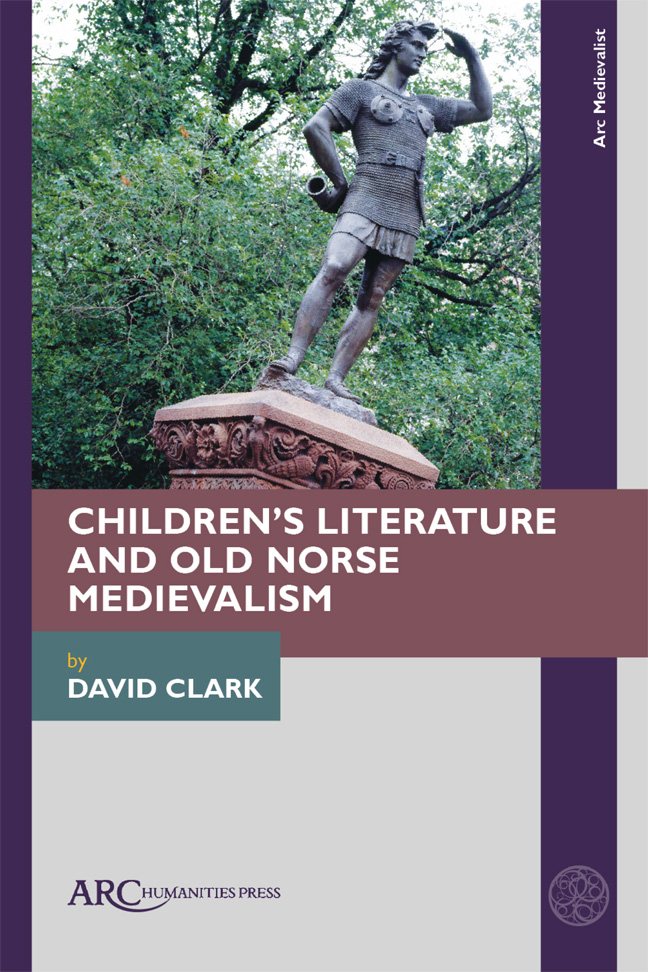Book contents
- Frontmatter
- Contents
- Acknowledgements
- Dedication
- Introduction: The End
- 1 Age-Related Categories
- 2 Generic Categories
- 3 Transformational Fantasy
- 4 Horned Helmets and Comic Anachronism
- 5 Viking Reputation
- 6 Runes and Magic
- 7 The Power of Story
- 8 Race and Ethnicity
- 9 Heroism
- 10 Viking Masculinity
- 11 Viking Femininity
- 12 Viking Sex and Gender
- 13 Bowdlerization
- 14 Sexuality
- 15 Ecological Threat
- 16 Norse Medievalism in Alan Early's Father of Lies Trilogy
- 17 Avoiding the End of Days: K. L. Armstrong and M. A. Marr's Blackwell Pages
- 18 Rick Riordan's Magnus Chase Series and Norse Medievalism
- Conclusion
- Select Bibliography of Frequently Cited Works
- Index
7 - The Power of Story
Published online by Cambridge University Press: 17 February 2024
- Frontmatter
- Contents
- Acknowledgements
- Dedication
- Introduction: The End
- 1 Age-Related Categories
- 2 Generic Categories
- 3 Transformational Fantasy
- 4 Horned Helmets and Comic Anachronism
- 5 Viking Reputation
- 6 Runes and Magic
- 7 The Power of Story
- 8 Race and Ethnicity
- 9 Heroism
- 10 Viking Masculinity
- 11 Viking Femininity
- 12 Viking Sex and Gender
- 13 Bowdlerization
- 14 Sexuality
- 15 Ecological Threat
- 16 Norse Medievalism in Alan Early's Father of Lies Trilogy
- 17 Avoiding the End of Days: K. L. Armstrong and M. A. Marr's Blackwell Pages
- 18 Rick Riordan's Magnus Chase Series and Norse Medievalism
- Conclusion
- Select Bibliography of Frequently Cited Works
- Index
Summary
MEDIEVALIST AUTHORS OFTEN intertwine the various individual elements picked out in these thematic chapters. The idea of “story,” whether spoken or written, in particular picks up the motifs of runes and the importance of reputation as well as providing a transition to a focus on various aspects of personal identity.
Viking Gold
The role and power of stories is the central theme of V. Campbell's YA novel Viking Gold (2011). It is set just before the year 1000, but its epigraph is from William Henley's 1875 four-stanza poem Invictus, which ends: “I am the master of my fate: / I am the captain of my soul.” Henley's poem celebrates the individual human spirit's ability to fight on against pain, age and death, and yet remain stoic and defiant; it has been quoted by a bewildering variety of public figures and fictional characters, including Winston Churchill during the Second World War (1939–45) and C. S. Lewis in his allegorical and semi-autobiographical The Pilgrim's Regress (1933). In Viking Gold, such heroic stoicism is required of Redknee, a sixteen-year-old Northman.
At the start of the novel, Campbell depicts Redknee as discontent, fed up with sword-training: “What did it matter if he could fight? He was going to be a woodsman, a tracker. The village didn't need more warriors. His uncle had said it himself many times—the years of raiding were over. The world had changed” (1). The rest of the novel shows the process of change is ongoing and war and self-mastery stand in for the process of matu-ration, managing interpersonal conflict, and learning to respect others whilst forging one's own destiny. Redknee's literal journey is thus accompanied by an internal one as he strives both to discover the truth about his father and to choose which path in life to follow, what fate to choose, what his personal story should be.
Campbell indicates that the motivating factor for societal change is the arrival of Christianity, as Redknee's uncle Sven explains: “The soldiers of the White Christ are everywhere now. The abbeys and monasteries are not left unprotected as they once were. The King demands taxes from honest farmers” (30).
- Type
- Chapter
- Information
- Children's Literature and Old Norse Medievalism , pp. 65 - 72Publisher: Amsterdam University PressPrint publication year: 2023

